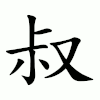叔
| ||||||||
Translingual
| Stroke order | |||
|---|---|---|---|
 | |||
Han character
叔 (Kangxi radical 29, 又+6, 8 strokes, cangjie input 卜火水 (YFE), four-corner 27940, composition ⿰尗又)
Derived characters
References
- KangXi: page 165, character 42
- Dai Kanwa Jiten: character 3154
- Dae Jaweon: page 376, character 24
- Hanyu Da Zidian (first edition): volume 1, page 396, character 1
- Unihan data for U+53D4
Chinese
Glyph origin
| Historical forms of the character 叔 | ||
|---|---|---|
| Western Zhou | Warring States | Shuowen Jiezi (compiled in Han) |
| Bronze inscriptions | Chu slip and silk script | Small seal script |
 |
 |
 |
Characters in the same phonetic series (尗) (Zhengzhang, 2003)
| Old Chinese | |
|---|---|
| 椒 | *ʔsliw |
| 茮 | *ʔsliw |
| 踧 | *l'ɯːwɢ, *ʔslɯwɢ |
| 蔋 | *l'ɯːwɢ |
| 惄 | *nɯːwɢ |
| 戚 | *sʰlɯːwɢ |
| 慼 | *sʰlɯːwɢ |
| 鏚 | *sʰlɯːwɢ |
| 慽 | *sʰlɯːwɢ |
| 磩 | *sʰlɯːwɢ |
| 寂 | *zlɯːwɢ |
| 嘁 | *ʔsluːb |
| 墄 | *sʰlɯːɡ |
| 摵 | *srɯːɡ, *ʔslɯwɢ, *srɯwɢ |
| 督 | *ʔl'uːwɢ |
| 錖 | *ʔl'uːwɢ |
| 裻 | *ʔl'uːwɢ, *sluːwɢ |
| 傶 | *ʔslɯːwɢ |
| 蹙 | *ʔslɯwɢ |
| 槭 | *ʔslɯwɢ |
| 縬 | *ʔslɯwɢ, *ʔsrɯwɢ |
| 顣 | *ʔslɯwɢ |
| 敊 | *l̥ʰɯwɢ |
| 琡 | *ʔljɯwɢ, *l̥ʰjɯwɢ |
| 俶 | *l̥ʰjɯwɢ |
| 埱 | *l̥ʰjɯwɢ |
| 淑 | *ɦljɯwɢ |
| 婌 | *ɦljɯwɢ |
| 尗 | *hljɯwɢ |
| 叔 | *hljɯwɢ |
| 掓 | *hljɯwɢ |
| 菽 | *hljɯwɢ |
| 鮛 | *hljɯwɢ |
Shuowen erroneously considers it to be a phono-semantic compound (形聲, OC *hljɯwɢ) : phonetic 尗 (OC *hljɯwɢ) + semantic 又 (“hand”).
Etymology 1
| simp. and trad. |
叔 | |
|---|---|---|
| alternative forms | ||
Sagart (1999) connects it to 督 (OC *ᵃtuk, “middle”) and reconstructs the Old Chinese as *ᵇs-tuk, the prefix possibly having a nominalizing function.
Alternatively, Starostin proposes a possible derivation from Proto-Sino-Tibetan *t(h)u (~ -iw) (“nephew”) and reconstructs the Old Chinese as *tikʷ (< *tiw-k?) ~ *tu-k.
Pronunciation
Definitions
叔
- † third brother
- paternal uncle (father's younger brother)
- brother-in-law (husband's younger brother)
- uncle (a term of address for a man around one's father's age or slightly younger)
- a surname
Synonyms
Dialectal synonyms of 叔父 (“paternal uncle (father's younger brother)”) [map]
Dialectal synonyms of 小叔子 (“brother-in-law (husband's younger brother)”) [map]
Compounds
Derived terms from 叔
Descendants
Etymology 2
| simp. and trad. |
叔 | |
|---|---|---|
| alternative forms | ||
Cognate with 收 (OC *qʰljɯw, “to gather; to harvest”) (Schuessler, 2007).
Pronunciation
Definitions
叔
- † to gather; to harvest
- 七月食瓜,八月斷壺,九月叔苴,采荼薪樗。 [Pre-Classical Chinese, trad.]
- From: The Classic of Poetry, c. 11th – 7th centuries BCE, translated based on James Legge's version
- Qīyuè shí guā, bāyuè duàn hú, jiǔyuè shū jū, cǎi tú xīn chū. [Pinyin]
- In the seventh month, they eat the melons;
In the eighth, they cut down the bottle-gourds;
In the ninth, they gather the hemp-seed;
They gather the sowthistle and make firewood of the Fetid tree.
七月食瓜,八月断壶,九月叔苴,采荼薪樗。 [Pre-Classical Chinese, simp.]
Pronunciation
Pronunciation
Pronunciation
Japanese
Korean
Etymology
From Middle Chinese 叔 (MC ɕɨuk̚). Recorded as Middle Korean 슉〮 (syúk) (Yale: syuk) in Hunmong Jahoe (訓蒙字會 / 훈몽자회), 1527.
Compounds
Vietnamese
This article is issued from Wiktionary. The text is licensed under Creative Commons - Attribution - Sharealike. Additional terms may apply for the media files.